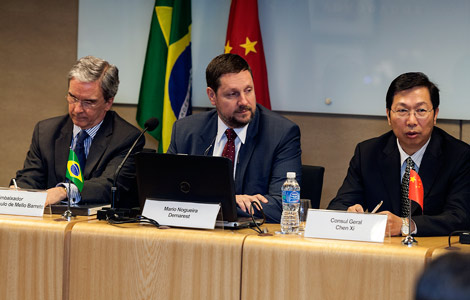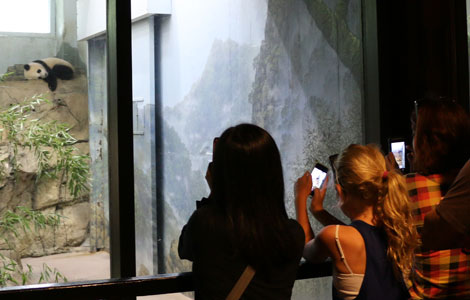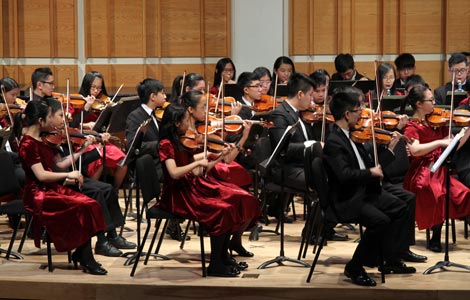Cultural exchanges boost China's LatAm ties
Updated: 2014-07-28 06:14
By Ji Ye in Rio de Janeiro (China Daily Latin America)
|
||||||||
Among the national gifts that Chinese President Xi Jinping gave to the Latin American countries during his recent visit, a set of DVDs with Chinese movies stole the limelight.
The movies, including Beijing Youth and To Elderly With Love by renowned Chinese director Zhao Baogang, and Love Is Not Blind by Teng Huatao, tell stories about ordinary Chinese people and their pursuit of dreams, happy families and love.
Instead of traditional ones like silk, porcelain and giant pandas, the new gifts promote China's changing cultural exchanges.
"Even I didn't expect that President Xi would sign the copies and give them as national gifts to Argentina's vice-president," said Chi Yufeng, chairman of Perfect World, which produced the three movies.
Cultural exchanges between China and Latin America have been enhanced since President Xi visited Latin America last year. According to Chi, Perfect World and Chinese cultural companies are enjoying more developing opportunities on the continent and the "Made in China" cultural products are feeling a warm welcome from the market.

With frequent visits by leaders, widening economic cooperation, China-Latin American ties will spur faster development in cultural exchanges, said Chi.
"As the economic development reaches a certain level, the demand for entertainment and cultural life will be higher than before, so the cultural industry has enormous potential for development," he added.
"The leaders of China and Latin America show their foresight by putting the cultural industries as one of the key exchange cooperation. It will definitely deepen the understanding of each other's culture, and help to feel the charm and fun of each other's emerging culture."
President Xi's gifts of DVDs to Latin America could be a signal that China's cultural products are about to "go global".
Chi said that the oversea revenue of Perfect World has taken up one fourth of its total revenue, while their oversea businesses increase in leaps and bounds. "Currently Chinese cultural industry has a promising future to ‘go global'," he said.
The film and television industry is one of the key development areas of Perfect World's "going global" exploration. "The Piano in a factory", which was invested by the company, was awarded the "Best International Film" at the Miami International Film Festival, while their TV series like "Beijing Youth" also enjoy high ratings in overseas.
Meanwhile, Perfect World also aims at the potential games market in Latin America. According to Chi, a research report shows that till 2015 the value of Latin American online games market and social games market are expected to reach $1.3 billion and $ 500 million respectively. With the fast and widespread of mobile internet, the Latin American games market will enter an explosive growth phase.
As a major Chinese games exporter, World Perfect undoubtedly hopes to seize the opportunity. The company, which aims to develop and market games with Chinese characteristics, has exported more than ten games products to over a hundred countries and regions worldwide.
In Latin America, for example, through a stable cooperative relationships with local partners, three of the Perfect World's online games products are among the top popularities in the local market.
"Chinese cultural products are more and more popular in Latin America. Perfect World is scheduled to actively develop international staff, and build the industrial chain of works and marketing, to explore a new output mode on the mainstream market in Europe and America as well as Brazil and other emerging markets," Chi said.
There used to be a lack of cultural products that reflect the daily life of the Chinese people, resulting in a lack of appeal to the outside world. In contrast many Western countries like the US and Asian countries like South Korea and Japan have both gained economic benefits and raised their profile through exporting cultural products.
In the past, China's cultural exchanges tended to be more traditional than modern, and more political than sentimental, and featured the elite rather than the grassroots. However, with the upgrading of China's international status, it has become essential for China to present a modern vision of the country through cultural exchange.
"In the process of 'going global' of China's cultural industry, we also have to learn the essence of other cultures, to borrow localized intelligence and R& D resources, and to minimize and circumvent the side effects caused by the cultural differences. Only through this way can the China's culture be recognized and accepted," Chi said.
For China Daily

 Chery automobile plant nearing Brazilian launch
Chery automobile plant nearing Brazilian launch
 42 naval vessels conduct exercises near Hawaii
42 naval vessels conduct exercises near Hawaii
 Brazil launches China desk to handle economic ties
Brazil launches China desk to handle economic ties
 NY Wheel reels in Chinese EB-5 investors
NY Wheel reels in Chinese EB-5 investors
 The Penguins of Madagascar to enter China
The Penguins of Madagascar to enter China
 Film ambassador promotes Chinese films, TV series in US
Film ambassador promotes Chinese films, TV series in US
 Panda cub Bao Bao turns one
Panda cub Bao Bao turns one
 HK kid's symphony returns to NY
HK kid's symphony returns to NY
Most Viewed
Editor's Picks

|

|

|

|

|

|
Today's Top News
Consulate condemns killing of student
iPhones' access to data facing scrutiny
Glitch delays visas for US-bound students
Cooperation with China brings new opportunity to Latin America
Scandal-hit food firm withdrawing products
Chinese USC grad student found dead after attack
US to issue antidumping decision on Chinese solar products
Manufacturing hits an 18-month high
US Weekly

|

|






